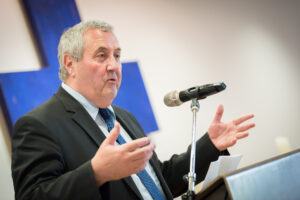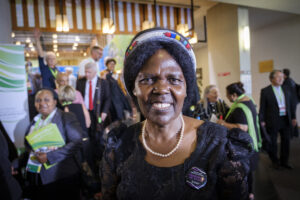
Rev. Professor Ioan Sauca, Interim Secretary General of the World Council of Churches (WCC Photo)
Rev. Dr. Ioan Sauca, interim general secretary of the World Council of Churches, announced that the organization is engaging in a process of reshaping and consolidating the organization’s presence in Jerusalem. Sauca, who will be serving as interim general secretary of the organization until a permanent replacement is elected early next year, made the announcement at an online press conference that took place at the beginning of the online meeting of the WCC’s Central Committee.
The consolidation of the organization’s presence in Jerusalem will result in the creation of an office in the city which will be under the authority of a WCC staffer in Geneva who is responsible for the organization’s actions in the Middle East, Sauca declared in the press conference.
“We have a policy on advocacy which is also to be approved by our governing body,” Sauca said. “So, we have clear lines now, who is doing what and how we do it. And why we do that? To be sure that whoever speaks on behalf of these programs speaks in the line of the WCC policies, not to let to let freelancers speaking here and there how they think and how they like.”
The reorganization is being implemented after CAMERA raised questions about the actions of activists associated with the WCC’s Ecumenical Accompaniment Program in Palestine and Israel and the online postings of WCC-supported staffer Yusef Daher in Jerusalem.
Sauca also indicated that the organization will not be participating in the upcoming 20th anniversary memorial of the UN anti-racism conference that took place in Durban South Africa in 2001.
The 2001 conference proved to be an inflection point in the growth of global antisemitism as so-called peace and justice activists used the meeting to demonize the Jewish state and its supporters. The WCC delegation to the 2001 conference played a role in blocking efforts to highlight the connection between anti-Israel propaganda and violence against Jews.
Several countries, including the United States and the United Kingdom, have announced they will boycott the upcoming meeting in Durban in response to the event’s history of antisemitism.
“I don’t think we’re going to participate [in Durban] because we very strongly stay in our policies and we’re not going to change our policies,” Sauca said. “I told everybody who asked me that question. We have very clear policy since 1948.”
Sauca was emphatic in declaring that the WCC will address suffering on both sides of the Arab-Israeli conflict, that the organization recognizes Israel’s right to exist, and that antisemitism is a sin.
“Antisemitism is for us a sin,” Sauca said. “And we keep saying that. It is a sin. You cannot be Christian, denying our Christian roots, which are Jewish. We started from there. So to be antisemitic is against my identity. We keep saying it’s a sin.”
Sauca also expressed gratitude that the WCC is in continued dialogue with the International Jewish Committee for Interreligious Consultations (IJCIC), a high-level organization charged with interfaith discussions on a global scale.

Dr Agnes Abuom at a 2018 meeting at the WCC’s headquarters in Geneva. Abuom, serves as the moderator of the WCC’s Central Committee. (WCC Photo taken by Magnus Aronson and used with permission from WCC.)
In her opening comments to the Central Committee, moderator Dr. Agnes Abuom from the Anglican Church in Kenya spoke about anti-Jewish and anti-Muslim violence and then asked pointedly, “How about our own family? The persecution of Christians continues in my own continent. We’ve seen what continues to happen in Nigeria with Boko Haram kidnapping young people, particularly Christians.”
Abuom also went on to condemn violence against Christians in Kenya and Asia and the need to improve health care in the Global South.
The online WCC’s Central Committee meeting will last until June 29, 2021.
